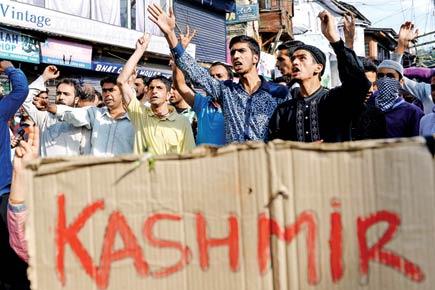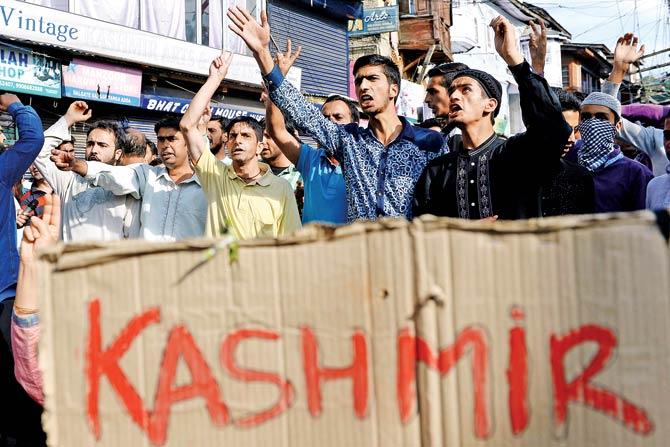Congress, which had once promised Kashmir that the “sky’s the limit”, is now on a silent, cowardly path to realising the sky is falling

 Camouflaged by the ruling party’s transparently insincere recent platitudes on Kashmir is the Congress Party’s continuing ambivalence to the crisis. Dr Manmohan Singh was our prime minister for 10 years and, during his time, India came close to a settlement on Kashmir with Pakistan, so you’d expect him to have more than a few words to say. Instead, he has been more silent than he was during his last four years as PM. P Chidambaram, who hopes to be the next Congress PM, publicly opined that successive governments of India, including those that included him, had failed to live up to the “grand bargain” of Kashmir joining India in October 1947. Perhaps politicians only make such statements in Opposition; this still could have provided PM Narendra Modi’s government the opening to reach out to Kashmiris, though that clearly was never Modi’s intention. Chidambaram’s own party advised him publicly to stick to the party line: this repudiation came in Parliament, from a J&K Congressman, Ghulam Nabi Azad. There was no clarity on what exactly is this party line.
Camouflaged by the ruling party’s transparently insincere recent platitudes on Kashmir is the Congress Party’s continuing ambivalence to the crisis. Dr Manmohan Singh was our prime minister for 10 years and, during his time, India came close to a settlement on Kashmir with Pakistan, so you’d expect him to have more than a few words to say. Instead, he has been more silent than he was during his last four years as PM. P Chidambaram, who hopes to be the next Congress PM, publicly opined that successive governments of India, including those that included him, had failed to live up to the “grand bargain” of Kashmir joining India in October 1947. Perhaps politicians only make such statements in Opposition; this still could have provided PM Narendra Modi’s government the opening to reach out to Kashmiris, though that clearly was never Modi’s intention. Chidambaram’s own party advised him publicly to stick to the party line: this repudiation came in Parliament, from a J&K Congressman, Ghulam Nabi Azad. There was no clarity on what exactly is this party line.
ADVERTISEMENT

Yet more protests were witnessed on Friday in Kashmir, which has been in the grip of unrest and curfews ever since the killing of terrorist Burhan Wani in July. Pic/AFP
Twenty-one years ago, the party line was laid down by the then PM and party president PV Narasimha Rao, who offered “the sky’s the limit” to Kashmiri aspirations. So confident of this was he that he made his offer in Burkina Faso, an African country unknown to most Indians. The offer left the details to Kashmiris, though they might have taken note of the previous year’s Parliament resolution, which reaffirmed India’s constitutional commitment to J&K. Narasimha Rao is now dead and a persona non grata with current Congress president Sonia Gandhi’s family. Her party has gone from the “sky’s the limit” to the sky is falling.
Congress vice-president Rahul Gandhi, for instance, made just one statement on Kashmir’s current crisis, way back on July 11, just days after the unrest boiled over: at an Eid Milan reception Rahul said that Modi had undone the UPA’s good work. Incidentally, Kashmiris themselves refer to Manmohan Singh’s tenure as the “lost decade”. Perhaps because the UPA held a lot of pointless roundtable conferences when clearly Kashmiris were expecting Manmohan Singh to pick up the thread from his predecessor, AB Vajpayee, and talk to the separatist All Parties Hurriyat Conference. Thus the little that Rahul has spoken was ill-judged.
Since then, the crisis’ tragic dimension has come to define it. Forget the number-crunching (50 days, 70 deaths, hundreds blinded, more injured — till date); years from now the Op-Eds you read will repeatedly mention 2016’s Summer of pellet-firings. Rahul has the credentials to be pro-active, daring even: after all, his great-grandfather (and our first PM) Jawaharlal Nehru was the one to reach the ‘grand bargain’ with Sheikh Abdullah. Rahul could have burnished those credentials by visiting Kashmir during the past 12 years and reminding everyone that Kashmir was in his blood; instead of taking a shikara ride on Dal Lake he chose to holiday at unknown foreign locales. Maybe he can still do so, if the rumours about his personal future are true.
Rahul and his party’s ambivalence, though, comes from something deeper — the fear of being caught on the wrong side of the pseudo-nationalism debate that Modi’s followers have ignited. It is a manufactured debate. There are no anti-nationals in our public life, only hyper-nationalists. Yet the possibility of being called anti-national seems to scare the daylights out of the Congress. Rahul thus cannot take a clear, principled stand or elucidate a party line on Kashmir; instead of a principle that may have consequences, he sticks to reacting to government statements. Someone should remind him that the only way to fight a pseudo-nationalist government like this is by taking a principled stand, even if it makes you unpopular on social media.
Chidambaram did it, and even the actor Ramya was bold in taking a stand against the current milieu when she, returning from Pakistan where she had attended a SAARC parliamentarian meet, contradicted our defence minister by saying that Pakistan was not hell, and Pakistanis were people just like us. For her candour, a citizen went to court seeking to file a sedition case against her (ironically at a time when Modi himself publicly states that many 19th century laws have no place in the 21st century, in which India is seeking to break its shackles). There did not appear to be any vociferous support from her party or her vice-president.
If the party doesn’t have a stomach for a fight, if it can’t sharpen its own identity at defining moments like Kashmir’s summer of 2016, then it is hardly likely to muster the necessary guts to make even a modest showing in the UP Assembly poll next year, or unseat Modi in 2019. The Congress, then, will realise that truly, the sky is falling.
Senior journalist Aditya Sinha is a contributor to the recently published anthology House Spirit: Drinking in India. He tweets @autumnshade. Send your feedback to mailbag@mid-day.com
 Subscribe today by clicking the link and stay updated with the latest news!" Click here!
Subscribe today by clicking the link and stay updated with the latest news!" Click here!






